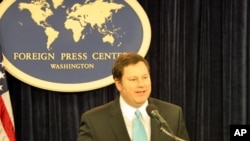From the very beginning, the Obama Administration has understood that no nation can stand or act alone, and that the challenges that confront citizens around the world must be addressed and resolved by the global community.
Thus, in the course of his first two years in office, President Barack Obama set U.S. foreign policy on a course that places a high priority on engaging with multinational organizations, and countries around the globe, said National Security Council Spokesman Mike Hammer at a recent Foreign Press Center conference that dealt with the future of U.S. Foreign Policy.
Under President Obama's leadership, said Spokesman Hammer, the United States has made every effort to strengthen alliances in Europe with NATO. In Asia, President Obama took part in the first ever US-ASEAN leaders meeting, and later this year, will host the APEC summit. The new administration also worked hard to re-set U.S. relations with Russia: a move that has already borne fruit in the form of a new START treaty. And along the way, the U.S. has begun to develop new partnerships to address issues that affect us all: issues such as human rights, food security, nuclear non-proliferation and the global economic crisis.
In the coming year, many aspects of U.S. foreign policy will remain the same, such as our unwavering commitment to advance the peace process in the Middle East, or our engagement with Asia.
But 2011 will also see a new emphasis on U.S. relations with its closest neighbors, "building on the common themes that are of concern for the peoples of the Americas." In March, President Obama "will travel to Brazil, Chile, and El Salvador as part of our engagement with our own hemisphere," said Spokesman Hammer.
"The President has a vision for the hemisphere in which he wants to strengthen the ongoing partnerships. . . . And he wants to continue to work on the issues that are of concern to the hemisphere, whether that's economic security, looking to build on the possibilities for greater trade relationships with the hemisphere, to strengthen democratic institutions, to provide for issues that relate to criminal security."
As President Obama said in his first speech before the United Nations General Assembly, "We come from many places, but we share a common future. . . . We must embrace a new era of engagement based on mutual interests and mutual respect, and our work must begin now."




